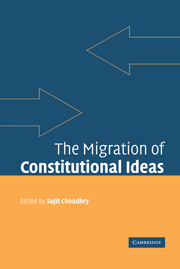Book contents
- Frontmatter
- Contents
- List of contributors
- Acknowledgements
- 1 Migration as a new metaphor in comparative constitutional law
- PART I The methodology of comparativism
- 2 On the blurred methodological matrix of comparative constitutional law
- 3 Some reflections on method in comparative constitutional law
- 4 The postwar paradigm and American exceptionalism
- PART II Convergence toward a liberal democratic model?
- PART III Comparative constitutional law, international law and transnational governance
- PART IV Comparative constitutional law in action – constitutionalism post 9/11
- Index
2 - On the blurred methodological matrix of comparative constitutional law
Published online by Cambridge University Press: 25 July 2009
- Frontmatter
- Contents
- List of contributors
- Acknowledgements
- 1 Migration as a new metaphor in comparative constitutional law
- PART I The methodology of comparativism
- 2 On the blurred methodological matrix of comparative constitutional law
- 3 Some reflections on method in comparative constitutional law
- 4 The postwar paradigm and American exceptionalism
- PART II Convergence toward a liberal democratic model?
- PART III Comparative constitutional law, international law and transnational governance
- PART IV Comparative constitutional law in action – constitutionalism post 9/11
- Index
Summary
These are relative heydays for comparative constitutional law scholarship. After a near century of embedded parochialism and intellectual stalemate, the field has recently seen a certain renaissance. From comparative inquiries of constitutional transformation to sophisticated analyses of comparative constitutional jurisprudence, the field has made a tremendous leap forward over the last few years. Even the US Supreme Court – perhaps the last bastion of parochialism among the world's leading constitutional courts – has recently joined the comparative-reference trend. But in spite of the growing interest in comparative constitutional systems, too little has changed in the epistemology and methodology of comparative constitutional law. Fundamental questions concerning the very purpose and rationale of comparative inquiry (and how that enterprise is to be undertaken) remain largely outside the purview of mainstream constitutional law scholarship. Genuinely comparative, problem-driven, and inference-oriented scholarship is still difficult to come by. More specifically, comparative constitutional law scholarship produced by legal academics often overlooks (or is unaware of) basic methodological principles of controlled comparison, research design, and case selection. The chapter addresses this lacuna by contrasting the approaches of legal academics and political scientists to the same sets of comparative constitutional phenomena. It suggests that while the study of comparative constitutional law by legal academics has contributed significantly to the accumulation of knowledge through the development of novel concepts and thinking, it has, for the most part, fallen short of advancing knowledge through tracing causal links among pertinent variables, let alone contributing to theory building through substantiation or refutation of testable hypotheses.
- Type
- Chapter
- Information
- The Migration of Constitutional Ideas , pp. 39 - 66Publisher: Cambridge University PressPrint publication year: 2007
- 6
- Cited by



